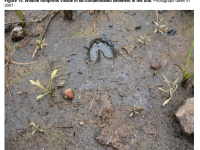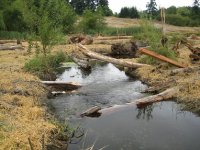Amended Restoration Plan Released for Enbridge Pipeline Case
May 17, 2024
The Enbridge Pipeline Release Trustees have finalized an Amendment to the Final Damage Assessment and Restoration Plan (PDF, 11 pages) that was released in 2015. The amendment addresses environmental injuries and human use losses and it replaces a previously selected recreational use and public access project that was identified in the 2015 Restoration Plan, with a suitable and comparable restoration alternative to compensate the public for injured natural resources and services near the Enbridge release site.
Angler’s Bend was one of the recreational use projects selected as part of the preferred alternative in the 2015 plan. That project is no longer viable due to safety concerns resulting from recent construction and bridge refurbishment activities. The Trustees are replacing the Angler's Bend project with the North Branch Park project, a comparable recreational use and public access project downstream of Angler’s Bend. Components of the North Branch Park project include regrading the area, providing a concrete boat launch in place of the existing earthen one, providing on-site gravel parking and access areas, creating a separate canoe and kayak launch area, planting trees, adding picnic tables, and relocating the entrance from Custer Drive to provide safer ingress and egress.
The Federal, State and Tribal Trustees in this matter include NOAA, the Department of the Interior, the State of Michigan, the Match-E-Be-Nash-She-Wish Band of the Potawatomi and the Nottawaseppi Huron Band of the Potawatomi.The trustees determined that the North Branch Park project is consistent with their original restoration goals and objectives and will provide equivalent recreational use benefits to those that would have been provided by the Angler’s Bend project.
The draft Amendment to the Restoration Plan was available for public review and comment for 30 days. No comments were received during the public comment period.






